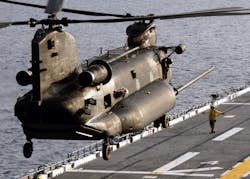Boeing to build another six special forces MH-47G twin-rotor heavy-lift helicopters in $212.6 million order
MacDILL AIR FORCE BASE, Fla. – Combat helicopter designers at the Boeing Co. will build six MH-47G twin-rotor heavy-lift helicopters for U.S. Special Operations Forces under terms of a $212.6 million order announced last week.
Officials of U.S. Special Operations Command at MacDill Air Force Base, Fla., are asking the Boeing Defense, Space & Security segment in Ridley Park, Pa., to provide six MH-47G rotary wing aircraft to sustain U.S. Special Operations heavy-assault helicopters.
Boeing engineers are carrying out a MH-47G renew project by using new, salvaged, reworked, or recapitalized components into an upgraded airframe, Special Operations Command officials say.
This upgrade to the special forces MH-47G includes new composite rotor blades, an improved drive train, single sponson fuel tanks, as well as strengthened aft, pylon, and nose sections.
The MH-47G heavy-lift helicopter is similar to the MH-47E, but has more sophisticated avionics including a digital common avionics architecture system (CAAS) -- a common glass cockpit used by different helicopters.
The MH-47G is an advanced heavy-lift helicopter that is operated by the 160th Special Operations Aviation Regiment (SOAR) at Fort Campbell, Ky.
The MH-47G is the most current and sophisticated MH-47 in service. It uses two T55-GA-714A engines with infrared exhaust suppressors to reduce the helicopter's vulnerability to infrared sensors and infrared-guided missiles.
Large fuel tanks that stick out from the sides of the helicopter extend the MH-47G's range, and the aircraft has an extendable probe for mid-air refueling.
The MH-47G has a glass digital cockpit that is compatible with night-vision goggles. It has five 6-by-8-inch liquid crystal multi-function display screens and two control display units. The cockpit shares the same processing and display units as the MH-60M Black Hawk helicopter.
The cockpit also has a digital moving map display, dual MIL-STD-1553 digital databuses, AN/ASN-137 inertial Doppler navigational set, CP1516-ASQ automatic target hand-off system, AN/ASN-149(V)2 GPS receiver, and Rockwell Collins AN/ARN-149(V) low-frequency automatic direction finder.
A forward-looking infrared (FLIR) and visible-light camera are mounted in a bubble under the helicopter's chin to enable pilots to fly at low levels at night and in bad weather. The CH-47G also has the Raytheon Silent Knight multi-mode radar that enables terrain-following, terrain-avoidance, and weather detection.
For more information contact Boeing Defense, Space & Security online at https://www.boeing.com/company/about-bds/, or U.S. Special Operations Command at www.socom.mil.

John Keller | Editor-in-Chief
John Keller is the Editor-in-Chief, Military & Aerospace Electronics Magazine--provides extensive coverage and analysis of enabling electronics and optoelectronic technologies in military, space and commercial aviation applications. John has been a member of the Military & Aerospace Electronics staff since 1989 and chief editor since 1995.

